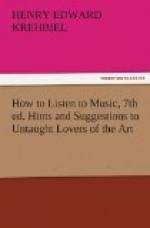[Sidenote: Origin of musical elements.]
[Sidenote: Feelings and counterpoint.]
It has been denied that feelings are the content of music, or that it is the mission of music to give expression to feelings; but the scientific fact remains that the fundamental elements of vocal music—pitch, quality, and dynamic intensity—are the results of feelings working upon the vocal organs; and even if Mr. Herbert Spencer’s theory be rejected, it is too late now to deny that music is conceived by its creators as a language of the emotions and so applied by them. The German philosopher Herbarth sought to reduce the question to an absurdity by expressing surprise that musicians should still believe that feelings could be “the proximate cause of the rules of simple and double counterpoint;” but Dr. Stainer found a sufficient answer by accepting the proposition as put, and directing attention to the fact that the feelings of men having first decided what was pleasurable in polyphony, and the rules of counterpoint having afterward been drawn from specimens of pleasurable polyphony, it was entirely correct to say that feelings are the proximate cause of the laws of counterpoint.
[Sidenote: How composers hear music.]
It is because so many of us have been taught by poets and romancers to think that there is a picture of some kind, or a story in every piece of music, and find ourselves unable to agree upon the picture or the story in any given case, that confusion is so prevalent among the musical laity. Composers seldom find difficulty in understanding each other. They listen for beauty, and if they find it they look for the causes which have produced it, and in apprehending beauty and recognizing means and cause they unvolitionally rise to the plane whence a view of the composer’s purposes is clear. Having grasped the mood of a composition and found that it is being sustained or varied in a manner accordant with their conceptions of beauty, they occupy themselves with another kind of differentiation altogether than the misled disciples of the musical rhapsodists who overlook the general design and miss the grand proclamation in their search for petty suggestions for pictures and stories among the details of the composition. Let musicians testify for us. In his romance, “Ein Gluecklicher Abend,” Wagner says:
[Sidenote: Wagner’s axiom.]
“That which music expresses is eternal and ideal. It does not give voice to the passion, the love, the longing of this or the other individual, under these or the other circumstances, but to passion, love, longing itself.”
Moritz Hauptmann says:
[Sidenote: Hauptmann’s.]




